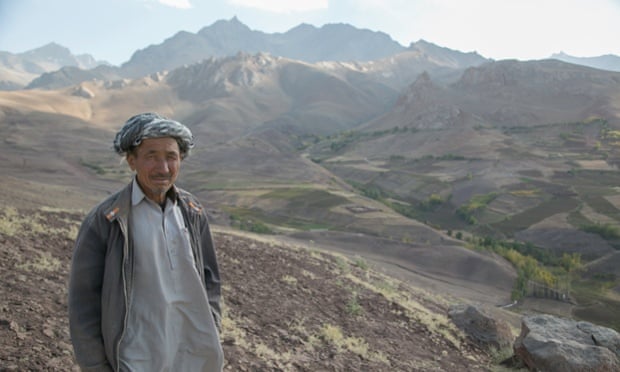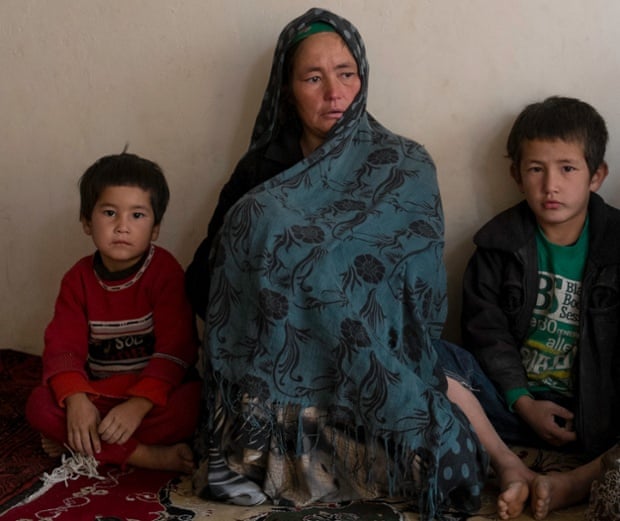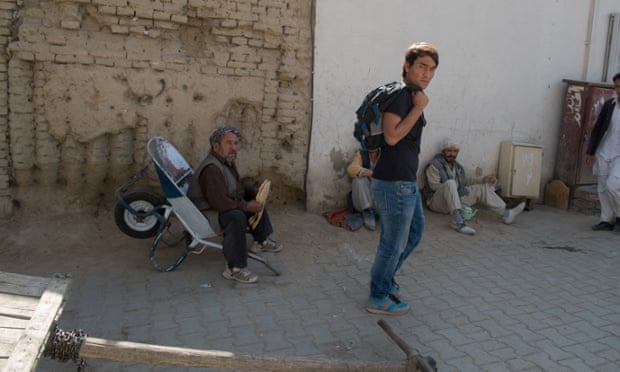Resurgent Taliban targets Afghan Hazara as Australia sends them back
In Afghanistan, more and more Hazara are preparing to flee a
resurgent Taliban, just as Australia has started returning Hazara asylum
seekers. Another is being deported on Wednesday

Juma, a Hazara man, standing on his ancestral lands. In the background
is the mountains where his daughter froze to death while they hid from
the Taliban in a 1998 attack. Photograph: Abdul Karim Hekmat for the
Guardian
It was midnight in Ghor when the Taliban appeared on the road in the headlights of the minivans, waving at the vehicles to stop.
There were 20 men on the road, carrying Kalashnikovs. Nearby stood a truck, stopped earlier by the same men, now fully ablaze.
The Taliban boarded the buses and ordered everybody off.
By the light of the burning vehicle they checked everyone’s face against the ID they carried.
The 13 Hazara – easily distinguished by their facial features – were
roughly moved into a separate line. They were marched away into the
darkness and shot.
The victims had been travelling to Kabul for Eid, to celebrate the
end of Ramadan with their families. Among the dead was a child and a
couple married only a few days earlier, travelling to their honeymoon.
Fatima’s husband died in the darkness on the side of the road that
night. “Life is very hard after I lost my husband … the night is night
but the day is also like night for me,” she tells Guardian Australia
from her home in Kabul. She wipes tears from her eyes with the hem of
her chador.

Hazara woman Fatima, whose husband
was killed by Taliban insurgents in a roadside attack this year. Her
family has been left destitute by his death.
Photograph: Abdul Karim Hekmat for the Guardian
“What was his crime to be killed that way? He was just bringing some food to the table for his children.”
Fatima and her six children have been left destitute following her husband’s death.
She cannot afford to send them to school. Her 12-year-old son finds work on the streets to feed the family.
“My heart aches when I look at other fathers who cuddle their
children on the street. I hear them call ‘daddy’. But my children don’t
have a father. I have a little four-year-old boy who used to hang on his
father’s shoulder all the time. He always asks me ‘where is my
father?’”
Afghanistan, which for generations has known only the brutal, grinding waste of war, is as dangerous as it has ever been.
Over 13 years the presence of hundreds of thousands of foreign soldiers brought no peace to a benighted land.
And their withdrawal has left a power vacuum that is being filled by whomever is most brutal and most ruthless.
Afghanistan’s ethnic and religious minorities, such as the Hazara of the country’s central plains, again face persecution.
“Hazara are being killed because of their ethnicity right across the
country,” Mohammad Musa Mahmoudi, executive director of Afghanistan
Independent Human Rights says. “It has happened several times.”
The enmity is ancient, and runs deep. Hazara are Shia muslims,
“kafirs” (infidels) to the Sunni Taliban. “Hazara are not Muslim.
Killing them is not a sin,” Mullah Manan Niazi, the Taliban governor of
Mazar-e-Sharif, said in a public address to his followers.
In 1998 Taliban extremists drove Hazara in their thousands from the city into the surrounding Koh-e-baba mountains.
Eight thousand were slaughtered, while others died in the cold of the
hills. Hazara farmer Juma was one of those who fled, as the Taliban
burned down his village. His eight-year-old daughter froze to death as
he held her.
“Many people were killed in the caves and the mountains when they were caught by the Taliban.”
This year, for the first time since the war in Afghanistan began,
Australia has started deporting Hazara asylum seekers back to their
country, arguing it is safe for them to return.
The Australian government concedes it is not safe for them to live in
their villages, or to travel the roads to their homelands controlled by
the Taliban and impassable. But it says it is safe for Hazara in the
capital, Kabul.
On Wednesday, Australia is due to forcibly deport a third Afghan
Hazara this year when 33-year-old Faiz (not his real name) will be put
on a plane bound for Kabul with a clutch of guards.
Once there, the guards will leave him on the streets of the city he fled more than two years ago.
Faiz was a farm worker from Jaghori district who says he was
kidnapped twice by the Taliban and impressed into forced labour before
being released.
He says he was told by a Talib he was believed to be a spy for the Americans, and warned he was on his last chance.
Last year, the Australian government’s assessment process found Faiz
was not a refugee requiring Australia’s protection, and that it was safe
for him to return.
But the Refugee Council of Australia has briefed immigration
department officials that the government’s knowledge of the security
situation in Afghanistan was out of date, and that it is not safe to
send any Hazara back.
The first Afghan Hazara to be returned, Zainullah Naseri, was
deported in August. Three weeks later he was stopped by the Taliban at a
roadside checkpoint on the way to his home district of Jaghori, in the
central province of Ghazni.
Naseri was captured and chained up, beaten and tortured, while his
captors negotiated a ransom for his release. He fled after two days,
using a rock to smash the chains that held his feet, and escaping
through the crude sewerage system. He is now living, still in hiding, on
the streets of the capital.

The first Afghan Hazara to be
returned by Australia, Zainullah Naseri, was deported in August. He was
captured by the Taliban, chained up, beaten and tortured.
Photograph: Abdul Karim Hekmat for the Guardian
Another Hazara man, Australian-Afghan Sayed Habib Musawi, who
returned home to see his grandchildren, was pulled off a bus at a
similar illegal Taliban checkpoint, on a nearby road between Jaghori and
Kabul. He was tortured before being shot and his body was dumped on the
side of the road.
Faiz is from the same Jaghori district as Zainullah and Sayed. All
the roads between Kabul and Jaghori are controlled by the Taliban.
At least another six Hazara men have been “redetained” by Australian
authorities, in anticipation of their expected deportation in the new
year.
From 1 January to 30 June, the United Nations documented 4,853
civilian casualties in Afghanistan, a 24% rise compared with 2013, when
casualties in turn were 14% higher than in 2012.
Suicide attacks in Afghanistan’s cities have risen 68%, and women and
the young are particularly at risk. A third of the civilians killed
this year have been children.
Australia’s ambassador to the UN, Gary Quinlan, told the security
council in September: “We have seen an increase in civilian casualties …
recent attacks involving large numbers of fighters are a particularly
worrying trend.”
Benjamin Lee, a former human rights lawyer for the UN in Afghanistan,
says the withdrawal of foreign troops has left a chasmic power vacuum
in Afghanistan.
“This has changed the war’s dynamics. Afghan security forces are now
clashing with Taliban and other insurgent groups in villages, in
communities, in populated areas,” Lee says. “Mortar rounds,
rocket-propelled grenades, heavy and small arms fire, improvised bombs,
characterise these exchanges, and the impact on civilians is tragically
predictable.”
The Taliban are moving away from the patient guerrilla tactics of
their war of attrition with the overwhelming might of the US. The
Taliban fight in the streets now. More people now die from gunfire than
bombs.
“This is an emboldened Taliban, this is changes in territorial
control, this is a consequence of the withdrawal of a lot of the
advanced technological equipment that international forces had available
to them, particularly aircraft,” Lee says.
“Particular ethnic groups, including the Hazara, have been
disproportionately targeted, but the point I would convey is that it’s
simply not safe to send anyone back, regardless of their ethnicity.”
The Australian government sends deported Afghan Hazaras back to
Kabul, arguing the capital is a safe place for them to live, even if the
roads to their homelands are under insurgent control and impassable.
Once, that was undoubtedly true. During the war, while western money
was still flooding into Afghanistan, Kabul was markedly safer than the
rural provinces that surrounded it, or the cities in the restive south.
It was far from an oasis of peace, but money and western interests
brought with them some measure of security.
But with the drawdown of foreign troops during 2014, Kabul has
spiralled into regular violence. In January, a suicide bomber blew a
hole in the wall of a Kabul restaurant frequented by westerners. Two
gunmen stepped through the hole and opened fire, killing 21 people where
they ate.
Two months later the Taliban breached the supposedly-secure Serena
hotel, and killed 10 people, including two children. In June, an attack
on presidential candidate Abdullah Abdullah killed 13 people. And in
August, the US sustained its highest-ranking wartime casualty since
Vietnam, when two-star Major General Harold Greene was shot dead by a
rogue Afghan soldier.
Last month, high-profile female politician Shukria Barakzai (who had
run a secret school for girls during the Taliban’s reign) was injured in
an attack on her car that killed three civilians.
And last week a suicide bomber killed a German civilian while watching a play being performed at a high school in Kabul.
“Taken together, these Kabul attacks,” Lee argues, “demonstrate that
restaurants, hotels, even the streets aren’t safe. When the top foreign
military brass can’t be protected, where does that leave the Afghan
civilians we are returning?”
A connection to the west, or a perceived sympathy for it, makes anyone a target, but particularly a member of a minority.
Zainullah Naseri’s ethnicity drew the Taliban’s attention, but it was
the Australian driver’s licence they found in his pocket that made him a
person worth capturing.
Hazara embraced the nascent democracy of post-2001 Afghanistan, in
response to the brutal oppression they had faced during the Taliban
rule.
During the next decade of foreign intervention, thousands found work
as interpreters for western forces, or truck drivers for the government.
Their children could again go to school, enrol in university or take
public service jobs.
But in 2014 the Hazara no longer have the protection of the wealthy,
powerful forces that once employed them, and find themselves again the
target of a resurgent Taliban.
“If the Taliban come back,” says Abdul Khaliq Azad from the Afghan
Strategic and Peace Studies in Kabul, “they would annihilate the Hazara
because of their staunch support for the foreign presence in
Afghanistan.”
The Taliban are back. So Hazara are leaving. Dozens of Hazara in
Kabul tell Guardian Australia they are preparing to leave Afghanistan,
by legal means or otherwise.
Supply and demand works in trafficking too. The people smugglers’
price for a ticket to Indonesia has halved in recent months, from
$12,000 to $6,000, as entire families – not just single men of working
age – decide to leave. Many have ambitions of ultimately reaching
Australia.
People in Kabul are aware of Australia’s “stop the boats” policy,
under which unauthorised vessels are forcibly turned around, or asylum
seekers removed to Nauru and PNG.
Many are discouraged, some are not.
The thousands of Hazara leaving this place are trying to get anywhere, be that Australia, or Indonesia, or Europe. They just know they have to leave.
Najibullah Naseri is from the same village as Zainullah (though no
relation). He is stuck in Kabul, unable to get home, and feeling
increasingly constricted in the capital. Every day the Taliban feel a
little closer.
“I have not seen my family in Jaghori for one-and-a-half years. So what’s the point of living here?”
He is preparing to leave, looking for a route, any route, that will
take him out of the country. “If the Afghan government can’t provide
security for us, we should free ourselves, before we are killed here.”
No comments:
Post a Comment